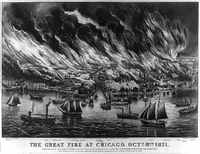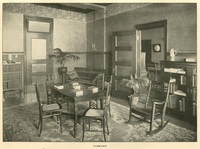Visions of a Better Chicago
In the late nineteenth century, many middle and upper class Chicagoans sought order in a city they considered plagued by working class violence. City leaders often invoked “civilization” as the solution to urban disorder, believing that beautiful buildings and an educated public would combat crime and immorality. Dedicated to “the higher civilization of humanity,” the Chicago Woman’s Club formed in 1876 as a literary club for the education of well-to-do women.
Disorder vs. Civilization
In the wake of the Great Fire of 1871, many citizens feared the instability of the city around them. The press highlighted bar brawls and street fights as evidence of Chicago’s combustible criminal element. In response, many Chicagoans embraced philanthropy, education, and morality as solutions to urban disorder.
Humani Nikil a Me Alienum Puto (Nothing Human is Foreign to Me)
The motto of the Chicago Woman’s Club (CWC) expressed a profound desire for knowledge that was satiated by semimonthly lectures on timely topics. The CWC met in parlors and public venues in its early years as a literary club before renting out comfortably furnished rooms in the Art Institute Building beginning in 1886. With committees on Education, Arts and Literature, Philanthropy, Reform, and Home, the CWC developed an expansive educational curriculum that provided a foundation for later reform work.
“I Pledge to Sustain its Good Work and Guard Its Reputation”
As one of the earliest women’s clubs in Chicago, the CWC became an important meeting place for affluent white women in the city. Starting out with only twenty-six members in 1876, the club quickly grew to over seven hundred members by 1900 and over thirteen hundred members by 1920. Despite the expanding member roll, the club maintained exclusive membership requirements. Although the Club opened its doors to African American members in 1895, Fannie Barrier Williams remained the only nonwhite member admitted for thirty years.


